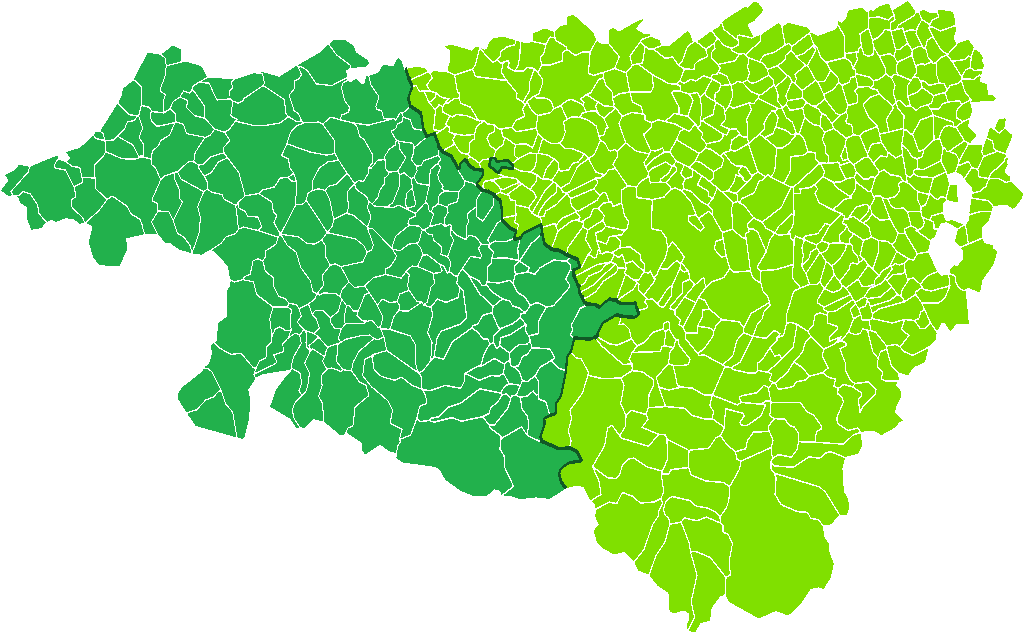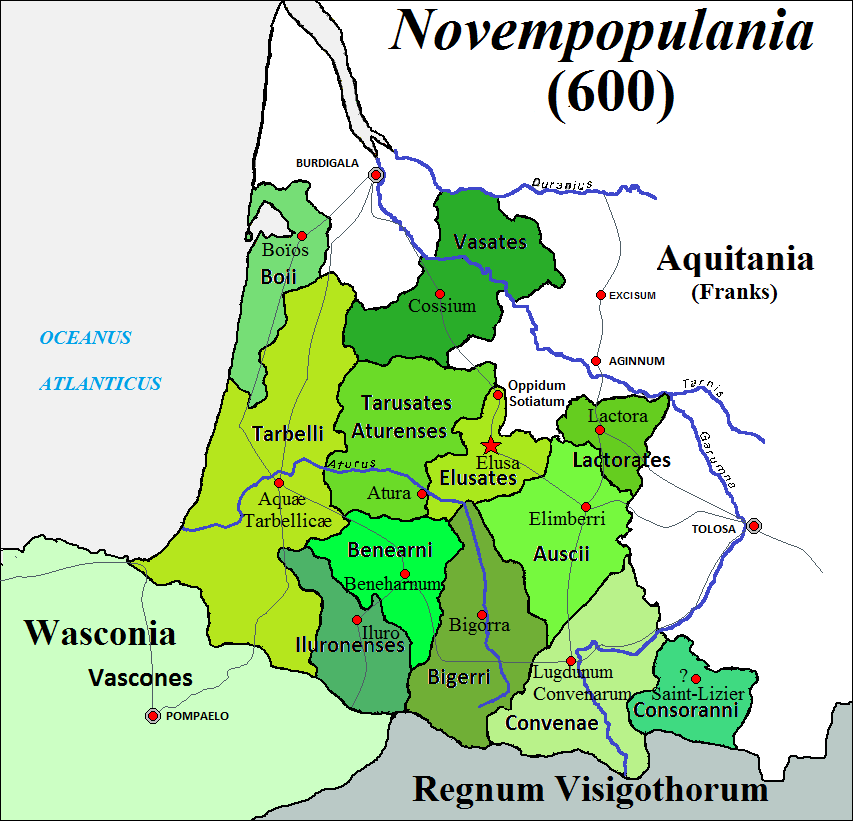|
Zuberoa
Soule (Basque: Zuberoa; Zuberoan/ Soule Basque: Xiberoa or Xiberua; Occitan: ''Sola'') is a former viscounty and French province and part of the present-day Pyrénées-Atlantiques ''département''. It is divided into two cantons of the arrondissement (district) of Oloron-Sainte-Marie (Mauleon-Licharre and Tardets-Sorholus), and a part of the canton of Saint Palais (arrondissement of Bayonne). Its provincial capital is Mauléon, which fused with Licharre in 1841 to form "Mauléon-Licharre", but today is often known as "Mauléon-Soule". Historically, Soule is the smallest province of the Basque Country (785 km2; 303 sq. mi.). Its population has been decreasing (23,803 in 1901; 16,006 in 1990; 15,535 in 1999). Etymology The territory is named ''Xiberoa'' in Souletin Basque, ''Zuberoa'' in standard Basque, ''Sola'' in Gascon and ''Soule'' in French; all of them derivate from ''Subola'', previous name of the region attested for the first time in the year 635 in the dia ... [...More Info...] [...Related Items...] OR: [Wikipedia] [Google] [Baidu] |
Souletin Dialect
Souletin or Zuberoan ( eu, Zuberera) is the Basque dialect spoken in Soule, France. Souletin is marked by influences from Occitan (in particular the Béarnese dialect), especially in the lexicon. Another distinct characteristic is the use of verb forms, a form of address including in third person verbs the interlocutor marker embedded in the auxiliary verb: → (s/he came → s/he came to you). Name In English sources, the Basque-based term ''Zuberoan'' is sometimes encountered. In Standard Basque, the dialect is known as (the province name and the language-forming suffix ). Various local forms are , and . In French, it is known as . In Spanish, the dialect is called or . Distribution The southern dialect Roncalese was sometimes included within Zuberoan. A Basque language variety close to Zuberoan may have extended more to the east, into the Central Pyrenees, as attested by placenames and historical records about the Basque peoples ( in the Royal Frankish Annals). Pho ... [...More Info...] [...Related Items...] OR: [Wikipedia] [Google] [Baidu] |
Northern Basque Country
The French Basque Country, or Northern Basque Country ( eu, Iparralde (), french: Pays basque, es, País Vasco francés) is a region lying on the west of the French department of the Pyrénées-Atlantiques. Since 1 January 2017, it constitutes the Basque Municipal Community ( eu, Euskal Hirigune Elkargoa, links=no; french: Communauté d'Agglomeration du Pays Basque, links=no) presided over by . It includes three former historic French provinces in the north-east of the traditional Basque Country totalling : Lower Navarre (french: Basse-Navarre, links=no; eu, Nafarroa Beherea, links=no), until 1789 nominally Kingdom of Navarre, with ; Labourd (), with ; Soule (), with . The population included in the Basque Municipal Community amounts to 309,723 inhabitants distributed in 158 municipalities. It is delimited in the north by the department of Landes, in the west by the Bay of Biscay, in the south by the Southern Basque Country and in the east by Béarn (although in the B ... [...More Info...] [...Related Items...] OR: [Wikipedia] [Google] [Baidu] |
Mauléon-Licharre
Mauléon-Licharre (; , Occitan: Maulion e Lisharra), or simply Mauléon, is a commune in the Pyrénées-Atlantiques department in southwestern France. It is the capital of the Soule (''Zuberoa'') historical Basque province. It is home to the canvas shoe, the espadrille and etorki cheese. Demographics See also *Communes of the Pyrénées-Atlantiques department The following is a list of the 546 Communes of France, communes of the Pyrénées-Atlantiques Departments of France, department of France. The communes cooperate in the following Communes of France#Intercommunality, intercommunalities (as of 202 ... References External links MAULE-LEXTARRE in the Bernardo Estornés Lasa - Auñamendi Encyclopedia (Euskomedia Fundazioa)(in Spanish) Soule Communes of Pyrénées-Atlantiques Pyrénées-Atlantiques communes articles needing translation from French Wikipedia {{PyrénéesAtlantiques-geo-stub ... [...More Info...] [...Related Items...] OR: [Wikipedia] [Google] [Baidu] |
Suburates
The Suburates (also named ''Sibulates'') were a pre-Roman tribe of the Aquitani, settled in what today is the historical territory of Soule (in Basque ''Xiberoa''), in the Northern Basque Country. From their name come the French and Occitan name for the region, ''Soule'', and the Basque names ''Xiberoa'' and ''Zuberoa''.Jacques Lemoine, ''Toponymie du Pays Basque Français et des Pays de l'Adour'', Picard 1977, The Suburates spoke a form or dialect of the Aquitanian language, a precursor of the Basque language. The Siburates mentioned by Julius Caesar, with the name of ''Sibusates'' in his ''Commentarii de Bello Gallico'', which was his firsthand account of the Gallic Wars, where he narrates the expedition of Publius Licinius Crassus to Aquitaine, and also by Pliny the Elder as ''Sybillates''. The name ''Subola'', precedent of present-day Soule and Zuberoa, is attested for the first time in 635, when a column of a Franco-Burgundian expedition led by Duke Arnebert against the Bas ... [...More Info...] [...Related Items...] OR: [Wikipedia] [Google] [Baidu] |
Basque People
The Basques ( or ; eu, euskaldunak ; es, vascos ; french: basques ) are a Southwestern European ethnic group, characterised by the Basque language, a common culture and shared genetic ancestry to the ancient Vascones and Aquitanians. Basques are indigenous to, and primarily inhabit, an area traditionally known as the Basque Country ( eu, Euskal Herria) — a region that is located around the western end of the Pyrenees on the coast of the Bay of Biscay and straddles parts of north-central Spain and south-western France. Etymology The English word ''Basque'' may be pronounced or and derives from the French ''Basque'' (), itself derived from Gascon ''Basco'' (pronounced ), cognate with Spanish ''Vasco ''(pronounced ). Those, in turn, come from Latin ''Vascō'' (pronounced ; plural '' Vascōnes''—see history section below). The Latin generally evolved into the bilabials and in Gascon and Spanish, probably under the influence of Basque and the related Aquitani ... [...More Info...] [...Related Items...] OR: [Wikipedia] [Google] [Baidu] |
Aussurucq
Aussurucq (; ) is a commune in the Pyrénées-Atlantiques department in the Nouvelle-Aquitaine region of south-western France. The inhabitants are known as ''Altzürükütar''.Euskaltzaindia - Academy of the Basque Language [...More Info...] [...Related Items...] OR: [Wikipedia] [Google] [Baidu] |
Julius Caesar
Gaius Julius Caesar (; ; 12 July 100 BC – 15 March 44 BC), was a Roman general and statesman. A member of the First Triumvirate, Caesar led the Roman armies in the Gallic Wars before defeating his political rival Pompey in a civil war, and subsequently became dictator from 49 BC until his assassination in 44 BC. He played a critical role in the events that led to the demise of the Roman Republic and the rise of the Roman Empire. In 60 BC, Caesar, Crassus and Pompey formed the First Triumvirate, an informal political alliance that dominated Roman politics for several years. Their attempts to amass power as were opposed by the within the Roman Senate, among them Cato the Younger with the frequent support of Cicero. Caesar rose to become one of the most powerful politicians in the Roman Republic through a string of military victories in the Gallic Wars, completed by 51 BC, which greatly extended Roman territory. During this time he both invaded Britain and built a b ... [...More Info...] [...Related Items...] OR: [Wikipedia] [Google] [Baidu] |
Commentarii De Bello Gallico
''Commentarii de Bello Gallico'' (; en, Commentaries on the Gallic War, italic=yes), also ''Bellum Gallicum'' ( en, Gallic War, italic=yes), is Julius Caesar's firsthand account of the Gallic Wars, written as a third-person narrative. In it Caesar describes the battles and intrigues that took place in the nine years he spent fighting the Celtic and Germanic peoples in Gaul that opposed Roman conquest. The "Gaul" that Caesar refers to is ambiguous, as the term had various connotations in Roman writing and discourse during Caesar's time. Generally, Gaul included all of the regions primarily inhabited by Celts, aside from the province of Gallia Narbonensis (modern-day Provence and Languedoc-Roussillon), which had already been conquered in Caesar's time, therefore encompassing the rest of modern France, Belgium, Western Germany, and parts of Switzerland. As the Roman Republic made inroads deeper into Celtic territory and conquered more land, the definition of "Gaul" shifted. Concu ... [...More Info...] [...Related Items...] OR: [Wikipedia] [Google] [Baidu] |
Pliny The Elder
Gaius Plinius Secundus (AD 23/2479), called Pliny the Elder (), was a Roman author, naturalist and natural philosopher, and naval and army commander of the early Roman Empire, and a friend of the emperor Vespasian. He wrote the encyclopedic ''Naturalis Historia'' (''Natural History''), which became an editorial model for encyclopedias. He spent most of his spare time studying, writing, and investigating natural and geographic phenomena in the field. His nephew, Pliny the Younger, wrote of him in a letter to the historian Tacitus: Among Pliny's greatest works was the twenty-volume work ''Bella Germaniae'' ("The History of the German Wars"), which is no longer extant. ''Bella Germaniae'', which began where Aufidius Bassus' ''Libri Belli Germanici'' ("The War with the Germans") left off, was used as a source by other prominent Roman historians, including Plutarch, Tacitus and Suetonius. Tacitus—who many scholars agree had never travelled in Germania—used ''Bella Germani ... [...More Info...] [...Related Items...] OR: [Wikipedia] [Google] [Baidu] |
Pyrénées-Atlantiques
Pyrénées-Atlantiques (; Gascon Occitan: ''Pirenèus Atlantics''; eu, Pirinio Atlantiarrak or ) is a department in the southwest corner of France and of the region of Nouvelle-Aquitaine. Named after the Pyrenees mountain range and the Atlantic Ocean, it covers the French Basque Country and the Béarn. Its prefecture is Pau. In 2019, it had a population of 682,621.Populations légales 2019: 64 Pyrénées-Atlantiques INSEE History Originally named Basses-Pyrénées, it is one of the first 83 created during the |
Aquitani
The Aquitani were a tribe that lived in the region between the Pyrenees, the Atlantic ocean, and the Garonne, in present-day southwestern France in the 1st century BCE. The Romans dubbed this region ''Gallia Aquitania''. Classical authors such as Julius Caesar and Strabo clearly distinguish the Aquitani from the other peoples of Gaul, and note their similarity to others in the Iberian Peninsula. During the process of Romanization, the Aquitani gradually adopted Latin (Vulgar Latin) and the Roman civilization. Their old language, the Aquitanian language, was a precursor of the Basque language Trask, L. ''The History of Basque'' Routledge: 1997 and the substrate for the Gascon language (one of the Romance languages) spoken in Gascony. History At the time of the Roman conquest, Julius Caesar, who defeated them in his campaign in Gaul, describes them as making up a distinct part of Gaul: Despite apparent cultural and linguistic connections to (Vascones), the area of Aquitania ... [...More Info...] [...Related Items...] OR: [Wikipedia] [Google] [Baidu] |





